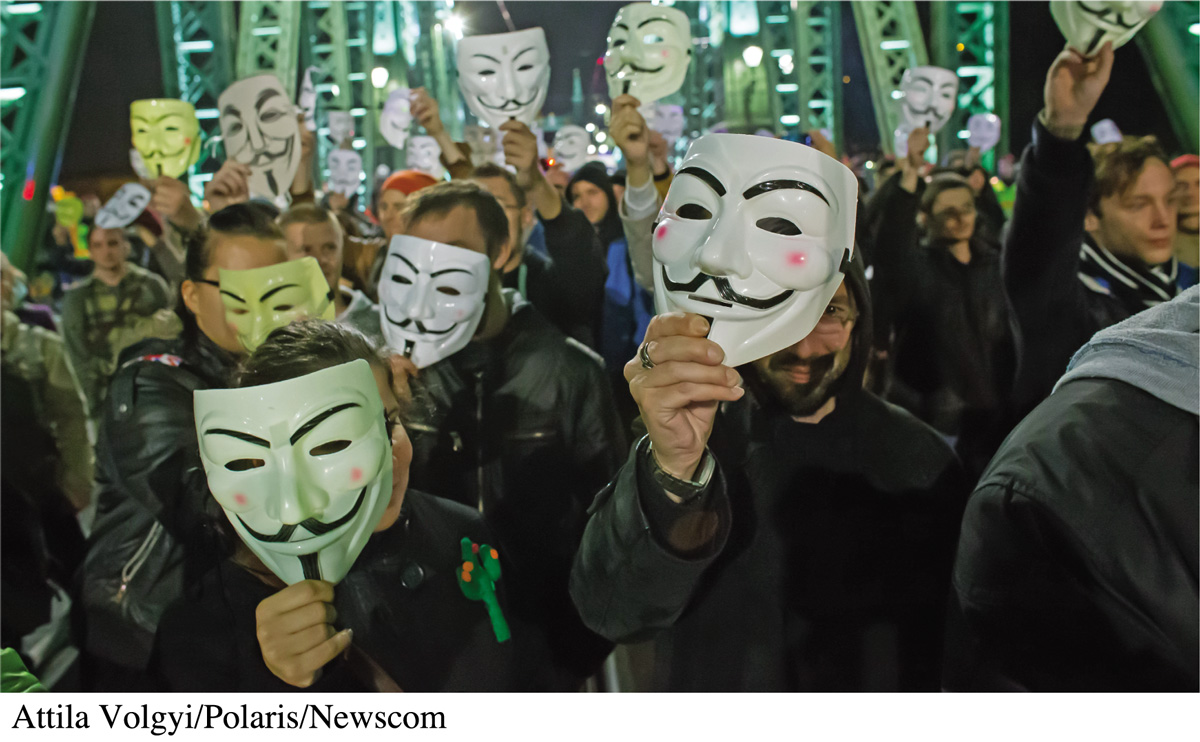CONVERGING MEDIA Case Study: Activism, Hacktivism, and Anonymous
CONVERGINGMEDIACase StudyActivism, Hacktivism, and Anonymous

Even if you aren’t very familiar with the loosely organized group of hacktivists—those who hack computer systems in the name of being activists for a cause—known as Anonymous, you may be familiar with the stylized Guy Fawkes mask often used as a symbol of the group. Masks of Fawkes (a member of a 1605 plot to assassinate King James I of England) have been a part of Guy Fawkes Day celebrations in England for centuries. The mask became even more internationally recognizable as a result of the Alan Moore graphic novel V for Vendetta and the 2006 film of the same name, in which the main character—part terrorist or part freedom fighter, depending on how you view him—is never seen without this mask. But it might be a different Moore novel (also made into a film) called Watchmen that best captures the conundrum of Anonymous as it quotes the Latin phrase, “Quis custodiet ipsos custodies?” which can be translated to “Who watches the watchmen?”


 Visit LaunchPad to watch a portion of We Are Legion: The Story of the Hacktivists. How does this film seem to portray the practice of hacktivism?
Visit LaunchPad to watch a portion of We Are Legion: The Story of the Hacktivists. How does this film seem to portray the practice of hacktivism?
Anonymous first came to widespread public attention in 2008 after a video of a fervent Tom Cruise, meant for only internal promotional use by the Church of Scientology, was leaked to the Web site Gawker. The church tried to suppress the video through copyright claims, and Anonymous retaliated. It launched a DDoS (distributed denial of service) attack (a flood of outside requests that can slow down or crash a server or network) on the Scientology Web site, inundated the church with prank calls and faxes, and “doxed” the church by stealing and then publishing sensitive internal documents. Since then, targets of Anonymous have ranged from the Indian government (protesting plans to block certain Web sites) to Monsanto (protesting malicious lawsuits and dominance of the food industry) to KKK members (revealing member identities and taking over the KKK’s Twitter account because of threats of violence against protesters in Ferguson, Missouri) to jihadists (crashing Web sites in the wake of the attack at the Charlie Hebdo magazine in Paris that left twelve dead).
Anonymous is more than an online presence. Real life sometimes converges with the virtual world when live protests feature people wearing the Guy Fawkes mask and refusing to be identified even when they do speak to members of the media. The anonymity is part of the group’s ethos. The group has a general agenda of sorts (distrust of governments, protection of a free and open Internet, opposition to child pornography, and a distaste for corporate conglomerates) and has championed causes (both online and with live demonstrators) ranging from the Occupy movement to the Arab Spring. But otherwise, there isn’t much organization to the group. Rather, it is made up of individual hackers who act independently without expecting recognition. A reporter from the Baltimore City Paper aptly characterized Anonymous as “a group, in the sense that a flock of birds is a group. How do you know they’re a group? Because they’re traveling in the same direction. At any given moment, more birds could join, leave, peel off in another direction entirely.”1
It’s often easy to see the moral high ground the group members are taking. But it’s also true that members of the group are violating a number of laws when they hack into private systems, cause those systems to crash, and expose the information on those systems. Certainly other hackers have caused serious harm through things like identity theft and the stealing of personal information. This sets up an ethical quandary, perhaps best exemplified when a hacker working under the Anonymous banner was identified and arrested. Deric Lostutter, a twenty-six-year-old programmer from Kentucky, helped to expose the cover-up of a rape of a sixteen-year-old girl in Steubenville, Ohio, by two high school football players in 2012. Lostutter posted a video taken by the rapists and their friends that showed that the girl was unconscious during the sexual violence. For some, Lostutter was a hero, shedding light on a cover-up that ultimately led to indictments against the school superintendent, coaches, and others. But for others, Lostutter was a criminal. His house was raided by the FBI, and by 2013 he was facing more than ten years in jail for his hacking work. Rolling Stone magazine pointed out the cruel irony: “Now he’s facing more jail time than the convicted rapists.” (One rapist received a minimum sentence of one year; the other got two years.)2
In essence, then, Anonymous sets itself up as a sort of vigilante watching over (and sometimes avenging) the deeds of powerful groups or other people guilty of serious crimes who might otherwise go unpunished. Because the members of Anonymous are indeed anonymous, the very flexibility that allows them their form of hacktivism also means that there is no oversight or accountability. Such oversight would likely silence or at least diminish the group, an outcome that runs counter to the ethos of fighting for the widest possible access and freedom of speech on the Internet. And so this leaves us with some profound questions: Do we need anonymous groups like Anonymous to serve as a kind of conscience or “watchman” over the Internet, because governments, corporations, and others in power can’t be trusted? And if Anonymous is the watchman, who, then, is watching the watcher?